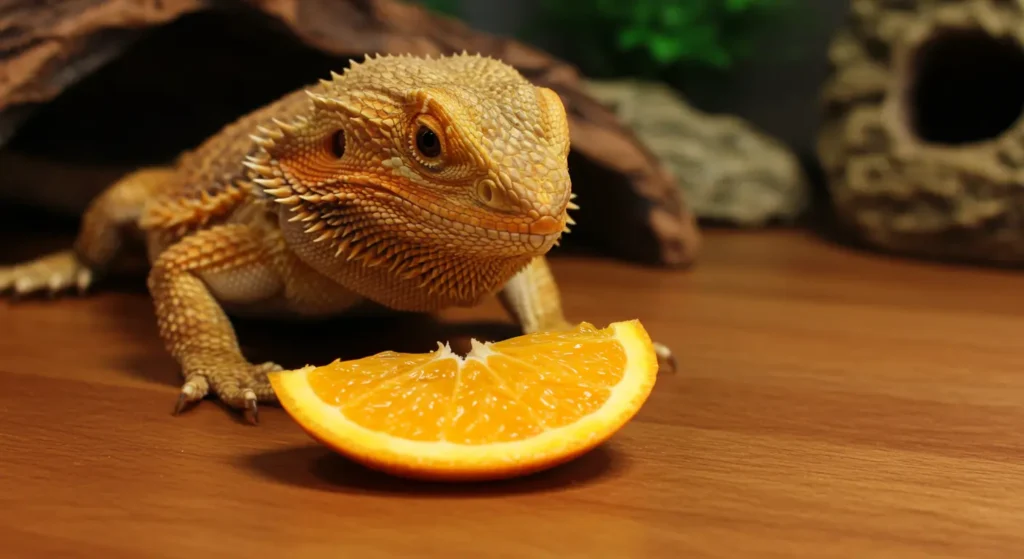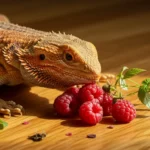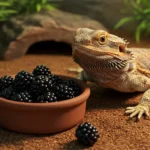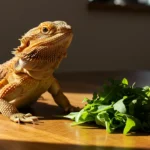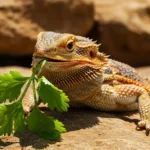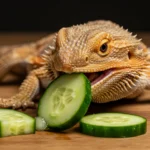When it comes to feeding your reptile companion, understanding what they can and can’t eat is essential for their long-term health. One question that often comes up among new and experienced owners alike is this: can a bearded dragon eat oranges? At first glance, oranges might seem like a healthy and refreshing treat — packed with vitamin C, potassium, and hydration. But when it comes to your beardie’s diet, things aren’t always so simple.
You may have heard conflicting advice about feeding citrus fruits to reptiles, especially oranges. So, what exactly should you know about oranges and bearded dragons? Are they safe in small amounts, or should they be avoided completely? In this article, we’ll answer the key question — can a bearded dragon eat oranges — and explore when, how, and if this juicy fruit belongs in your pet’s feeding routine.
Can a Bearded Dragon Eat Oranges Safely and in Moderation?
Feeding your bearded dragon a balanced diet is essential for its health and wellbeing. When it comes to oranges, many owners wonder if these citrus fruits can be safely included in their pet’s diet. Understanding the risks and guidelines can help you decide if and how to feed oranges to your beardie.
Are Oranges Safe for Bearded Dragons to Eat Occasionally?
Oranges are not toxic to bearded dragons, but they should be offered only occasionally and in small amounts. While oranges provide vitamin C and some hydration, they also contain high levels of citric acid and sugar, which can upset a beardie’s sensitive digestive system if given too frequently. The acidity may cause irritation or even mild inflammation in the digestive tract, which can lead to discomfort or diarrhea. Additionally, oranges have a poor calcium-to-phosphorus ratio, which can interfere with calcium absorption if overfed, potentially leading to bone health issues. Therefore, oranges should be considered an occasional treat rather than a dietary staple. When feeding oranges, always remove the peel and seeds, and offer only small, bite-sized pieces to minimize any risk.
Can a Bearded Dragon Eat Oranges in Water or Juiced?
Feeding oranges to bearded dragons in water or as juice is generally not recommended. Citrus juices, including orange juice, often contain concentrated sugars and acids, which can be harsh on a beardie’s delicate digestive system. Juice lacks the fiber present in whole fruit, which helps with digestion and nutrient absorption. Additionally, juice can increase the risk of dehydration and digestive upset due to its acidity and sugar concentration. Soaking orange slices in water might dilute some of the acids, but it does not eliminate the risks associated with citrus fruits. Plain, fresh water remains the best source of hydration for your bearded dragon. If you want to offer orange flavor, it is safer to provide small, fresh pieces of orange rather than juice or water infusions.
Feeding Oranges to Bearded Dragons: Portion and Frequency Guide
When feeding oranges to your bearded dragon, moderation is crucial. Offer only very small portions—typically a tiny slice no larger than a fingernail—and limit this treat to once every two weeks or even less frequently. Overfeeding citrus fruits can lead to digestive issues, including diarrhea and stomach upset, due to the acidity and sugar content. It’s important to remember that the bulk of a bearded dragon’s diet should consist of protein-rich insects and leafy greens, which provide essential nutrients and calcium. Fruits like oranges should only complement this primary diet. Always observe your pet’s reaction to new foods and remove any uneaten fruit to prevent spoilage, which can cause bacterial growth harmful to your dragon’s health.

Can a Bearded Dragon Eat Oranges Every Day? Why That’s Risky
Feeding oranges to your bearded dragon daily is risky and strongly discouraged. Oranges contain high levels of citric acid and sugars, both of which can negatively impact your pet’s digestive health if consumed regularly. Excess acid can cause irritation of the gastrointestinal tract, leading to symptoms like vomiting or diarrhea. Additionally, frequent exposure to the sugar in oranges can disrupt your bearded dragon’s natural gut flora and contribute to obesity or metabolic disorders. Another concern is the poor calcium-to-phosphorus ratio in oranges, which, if given daily, may interfere with calcium absorption and increase the risk of metabolic bone disease—a serious condition affecting reptiles. For these reasons, oranges should only be fed occasionally and never be part of a daily feeding routine.
The Health Risks of Feeding Oranges to Bearded Dragons
While oranges may seem like a nutritious treat, they can pose certain health risks to bearded dragons if fed improperly. Understanding these risks helps pet owners avoid potential complications.
How Citric Acid and Oxalates Affect a Bearded Dragon’s Health
Citric acid, found abundantly in oranges, can be harsh on a bearded dragon’s digestive system. The acidic nature may irritate the lining of the stomach and intestines, causing discomfort and possibly leading to digestive problems such as vomiting or diarrhea. Furthermore, oranges contain oxalates, naturally occurring compounds that bind to calcium and prevent its absorption. Calcium is vital for maintaining strong bones and muscle function in bearded dragons. When oxalates reduce calcium uptake, it increases the risk of metabolic bone disease, a dangerous condition that causes weak or deformed bones. Due to these effects, it’s important to limit citrus fruits in your beardie’s diet to occasional treats and avoid frequent feeding to keep your pet healthy.
What Happens If a Bearded Dragon Eats Orange Peels?
Orange peels are not suitable for bearded dragons and should always be avoided. The peels contain essential oils and compounds that can be toxic or irritating to reptiles. Even if the orange is organic, the peel’s rough texture and chemical makeup make it difficult for a beardie to digest and can cause intestinal blockages or irritation. Additionally, peels may carry pesticide residues if not properly washed. If your bearded dragon accidentally ingests orange peel, watch for signs like lethargy, loss of appetite, or abnormal stool. In such cases, it’s advisable to consult a reptile veterinarian promptly. Always peel oranges thoroughly before offering any fruit to your pet to prevent accidental ingestion of harmful substances.
High Sugar and Low Calcium: A Nutritional Mismatch
Oranges have a high sugar content, which can upset the natural balance of a bearded dragon’s diet. Excess sugar intake may lead to digestive problems such as diarrhea and obesity, especially when fed in large or frequent amounts. Additionally, oranges have a poor calcium-to-phosphorus ratio—an important factor in reptile nutrition. Bearded dragons require a diet high in calcium to support bone health, and phosphorus levels must be balanced accordingly. A diet with too much phosphorus and not enough calcium can result in metabolic bone disease, a condition that weakens bones and muscles. Because oranges contain more phosphorus relative to calcium, they are not an ideal regular food source and should be given only sparingly.
Signs of Digestive Stress from Citrus Fruits
Feeding citrus fruits like oranges to bearded dragons can sometimes cause digestive stress. Symptoms include loose or watery stools, bloating, lethargy, decreased appetite, and in some cases, vomiting. These signs often indicate irritation caused by the high acidity of citrus fruits. If your beardie exhibits any of these symptoms after consuming oranges or other citrus items, it’s important to stop feeding them immediately. Continuing to feed acidic fruits could worsen digestive upset and lead to dehydration or more serious health problems. Always introduce new foods gradually and observe your pet’s response to ensure they tolerate it well.
Better Fruit Choices Than Oranges for a Bearded Dragon’s Diet
Not all fruits are created equal when it comes to feeding bearded dragons. Some fruits offer better nutritional benefits and fewer risks than oranges.
Safer Fruits for Bearded Dragons to Enjoy Regularly
Fruits like mango, papaya, blueberries, and strawberries are much safer and healthier choices for bearded dragons compared to oranges. These fruits generally have lower acidity and better calcium-to-phosphorus ratios. For instance, mango and papaya provide essential vitamins like A and C without the harsh acids found in citrus. Blueberries and strawberries also offer antioxidants and fiber beneficial to digestive health. While fruits should never be the main diet, these options can be included as occasional treats to add variety and extra nutrients. Always wash fruit thoroughly and cut it into small, manageable pieces to prevent choking.
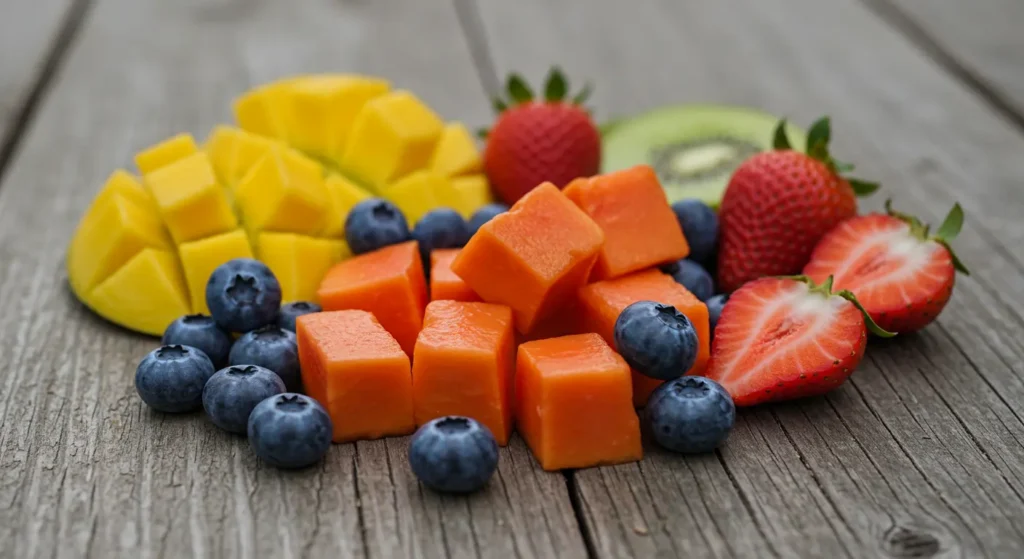
Comparing Oranges with Beardie-Approved Fruits (Mango, Papaya, etc.)
Compared to oranges, fruits such as mango and papaya are better suited for bearded dragons because they contain less acid and sugar. Mango is rich in vitamin A, which supports vision and immune health, while papaya offers enzymes that aid digestion. These fruits also tend to have a more favorable calcium-to-phosphorus ratio, helping maintain strong bones. Unlike oranges, they do not contain significant oxalates that interfere with calcium absorption. These differences make mango and papaya safer and more nutritious choices for your pet’s occasional fruit intake.
What Can Bearded Dragons Eat Besides Citrus Fruits?
Bearded dragons thrive on a varied diet primarily consisting of insects like crickets and mealworms, leafy greens, and some vegetables. Leafy greens such as collard greens, mustard greens, and dandelion greens are excellent calcium sources. Vegetables like squash and bell peppers add essential nutrients without excess sugar or acid. Fruits should only be given in small amounts as treats. Avoid starchy foods, iceberg lettuce, and high-oxalate vegetables that can interfere with nutrient absorption. A balanced diet that mimics their natural feeding habits is key to keeping your beardie healthy and active.
Creating a Balanced Fruit Feeding Routine for Reptiles
To keep your bearded dragon healthy, create a fruit feeding routine that emphasizes moderation and variety. Limit fruit treats to one or two times per week and rotate between safer fruits like mango, papaya, and berries. Always offer fresh, washed, and appropriately sized pieces to prevent choking and digestive issues. Combine fruits with a primary diet of protein-rich insects and leafy greens to maintain proper nutrition. Monitoring your pet’s reaction to new foods helps ensure they tolerate the variety well. Avoid citrus fruits like oranges as regular treats due to their acidity and sugar content.
Expert Tips for Feeding Oranges to Bearded Dragons Responsibly
Feeding oranges to your bearded dragon demands careful preparation and moderation. Applying expert advice helps you introduce this fruit safely while minimizing risks. Understanding how to prepare oranges and how often to feed them is essential for your beardie’s health.
Proper Orange Preparation: No Peel, No Juice, Just Tiny Slices
Always remove the peel completely before feeding oranges to your bearded dragon. Orange peels contain oils and pesticides that can irritate or harm your pet’s digestive system. Juice also should be avoided because it contains concentrated acids and sugars, which may upset your beardie’s stomach and lacks the fiber needed for proper digestion. Cutting the orange into tiny, bite-sized slices or cubes—no larger than a fingernail—makes eating easier and lowers the risk of choking. Ensure the fruit is fresh, thoroughly washed, and free of seeds, since seeds could cause choking or intestinal blockages. Preparing oranges carefully helps your beardie enjoy a safe and occasional citrus treat without complications.
How Often Can Bearded Dragons Eat Oranges Without Harm?
Limiting the frequency of orange treats is vital for your bearded dragon’s wellbeing. Oranges contain high levels of acidity and sugar, so feeding them no more than once every two to three weeks reduces the risk of digestive upset or nutritional imbalances. Prioritize a diet rich in insects, leafy greens, and vegetables, using fruits only as occasional supplements. Observing your beardie’s health and stool after feeding oranges provides valuable clues about tolerance and helps guide feeding habits. Frequent or daily feeding can negatively affect your pet’s health and should be avoided.
Warning Signs After Feeding Citrus to Your Beardie
Monitoring your bearded dragon after feeding citrus fruits is crucial for early detection of any adverse reactions. Symptoms such as diarrhea, loose stools, vomiting, bloating, lethargy, and decreased appetite often indicate digestive distress caused by citrus acidity and sugars. Should you observe these signs, immediately stop feeding citrus and provide fresh water to help flush out the system. Persistent or worsening symptoms require prompt veterinary consultation. Acting quickly helps protect your beardie’s health and ensures a comfortable recovery from any dietary irritation.
When to Avoid Oranges Entirely in Their Diet
Some bearded dragons should avoid oranges completely due to individual health considerations. Juveniles have sensitive digestive systems and do not tolerate citrus well. Additionally, dragons with metabolic bone disease, digestive issues, or obesity benefit from avoiding high-acid and high-sugar foods like oranges. Pregnant or shedding beardies may also experience irritation from citrus during vulnerable periods. When in doubt, always consult a reptile veterinarian before introducing new treats like oranges. Seeking professional advice keeps your beardie safe and supports their long-term health.
Can a Bearded Dragon Eat Oranges Occasionally? Final Thoughts
Deciding whether to feed oranges to your bearded dragon involves carefully weighing benefits against risks. Moderation, proper preparation, and awareness of potential health effects help you make informed choices. This final overview provides guidance to support your decisions.
Are Oranges Worth the Risk for Bearded Dragons?
Although oranges provide vitamin C and hydration, the associated risks often outweigh their benefits for bearded dragons. High acidity, sugar content, and an unfavorable calcium-to-phosphorus ratio make oranges less than ideal. Small, occasional portions may be tolerated, but frequent feeding risks digestive upset and nutritional imbalances. Safer fruits such as mango or papaya serve as better alternatives for your beardie. Always consider whether the health risks justify including oranges, and prioritize foods that promote your pet’s long-term wellbeing.
When to Consult a Reptile Vet Before Feeding Fruit
If you’re unsure about feeding oranges or any new fruit to your bearded dragon, consulting a reptile veterinarian is the best course of action. This is especially important if your beardie has a history of digestive problems, metabolic bone disease, or other health concerns. Veterinarians provide personalized advice and help create safe feeding plans tailored to your pet’s needs. Additionally, seek veterinary care promptly if your beardie shows symptoms like diarrhea or lethargy after eating citrus. Professional guidance ensures your beardie maintains optimal health.
A Look at a Citrus-Free Bearded Dragon Diet Plan
Many bearded dragons thrive on diets that exclude citrus fruits altogether. Such a diet focuses on insects, leafy greens like collard and mustard greens, and occasional non-citrus fruits like berries and melons. This approach reduces digestive upset risk and promotes better calcium-to-phosphorus balance for strong bones. Offering a variety of proteins, fibers, and vitamins through approved foods ensures your beardie receives essential nutrients without complications from citrus acids. A citrus-free diet often provides a safer, effective way to maintain your dragon’s health.
FAQs About Bearded Dragons and Citrus Fruit Consumption
Can bearded dragons eat orange peels? No. Orange peels contain oils and pesticides that can irritate or harm your beardie’s digestive tract and should be avoided entirely.
Can a bearded dragon eat oranges in water? Feeding oranges in water or juice form is not recommended because of the high acidity and sugar concentration, which can upset digestion.
Can a bearded dragon eat oranges every day? Daily feeding is risky due to acidity and sugar content. Oranges should only be given occasionally in small amounts to prevent health issues.
For further questions about your beardie’s diet or citrus fruit consumption, consulting a reptile specialist is advisable.
Conclusion
So, can a bearded dragon eat oranges? The answer is yes, but only with caution and in moderation. Oranges can provide some vitamins and hydration, yet their high acidity, sugar content, and poor calcium balance make them a risky choice for regular feeding. Proper preparation—removing peel and juice—and limiting portions to occasional treats are essential to keep your beardie healthy and happy. Remember, safer fruit alternatives and a well-balanced diet should always come first. If you have concerns about adding oranges or other citrus fruits to your pet’s menu, consulting a reptile veterinarian will help ensure you make the best choices for your bearded dragon’s wellbeing. Feeding your dragon responsibly supports a long, vibrant life full of energy and health.

